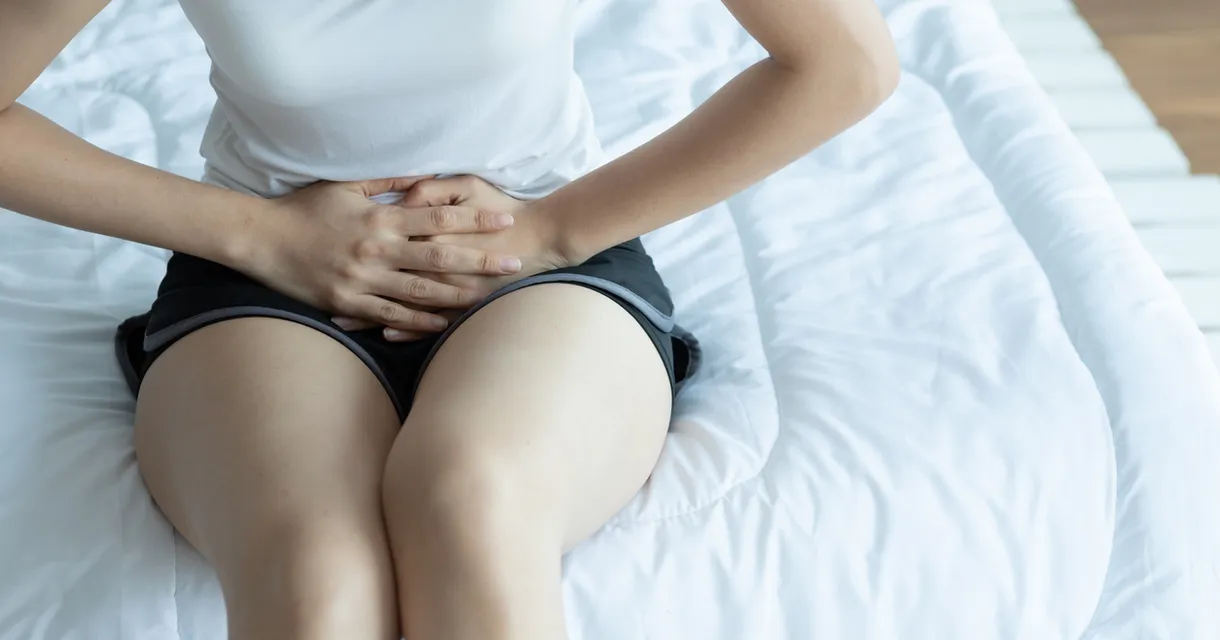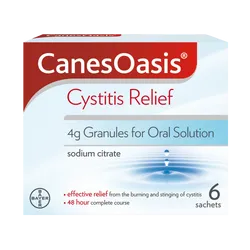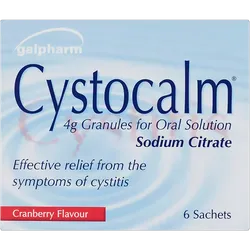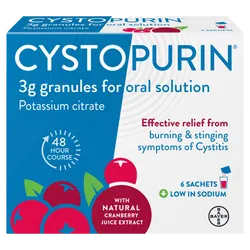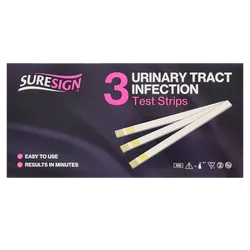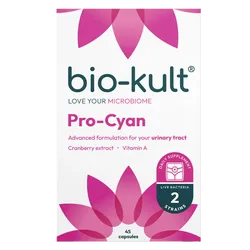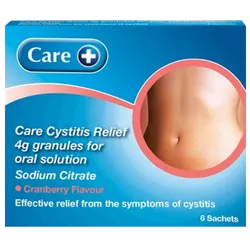What is Cystitis?
Cystitis is a type of Urinary Tract Infection (UTI) that specifically affects the bladder. It is a prevalent condition, particularly among women, and can lead to significant discomfort and irritation. While cystitis often resolves on its own within a few days, there are instances where it may require antibiotic treatment to effectively manage the symptoms and prevent further complications.
What are the Symptoms of Cystitis?
Symptoms of cystitis include:
-
A sensation of pain, burning, or stinging when urinating
-
Discomfort or pain located in the lower abdominal area
-
Experiencing an increased frequency of urination compared to usual
-
Urine that appears dark, cloudy, or has a noticeably strong odour
Cystitis Symptoms in Children
Babies and children can also get cystitis. Symptoms include:
-
Problems urinating
-
A high temperature
-
Not feeling hungry and feeling sick
Problems with their bladder or kidneys can cause cystitis, or they may be experiencing constipation. It's important that you contact your GP if you think your child has cystitis, as it can cause damage to their kidneys if left untreated.
How to Get Rid of Cystitis Fast at Home
-
Drink plenty of water to help flush out the infection, as staying hydrated can aid in diluting the urine and expelling bacteria from the urinary tract more effectively.
-
Avoid having sex during this time, as it can exacerbate symptoms and potentially introduce more bacteria into the urinary tract, which might worsen the condition.
-
Take paracetamol to reduce the pain, ensuring you do not exceed the recommended dosage of up to 4 times a day, as it can help alleviate discomfort and manage fever if present.
-
Avoid drinks such as coffee and alcohol, as they could irritate your bladder and worsen the symptoms by increasing bladder activity and causing further discomfort.
-
Go to the toilet regularly to ensure that you are emptying your bladder frequently, which helps in reducing the bacterial load in the urinary tract.
-
Hold a hot water bottle over your stomach, which can provide soothing relief from abdominal pain and cramping associated with cystitis.
-
Get plenty of rest to allow your body the energy and resources it needs to fight off the infection and recover more quickly.
Natural Remedies for Treating Cystitis at Home
Cranberry Juice
Many people drink cranberry juice while experiencing cystitis. Although there is little evidence to suggest this treats cystitis if the infection has already started, it may help toward preventing the infection in the first place. The vitamin C in cranberry juice will give your immune system a boost, which could help fight off the infection that causes cystitis more quickly.
Bicarbonate of Soda
Bicarbonate of soda is a common cystitis treatment, as it can alter the acidity levels in your urine, which can help to ease the pain. Mixing bicarbonate soda with water allows the alkaline solution to reach your bladder, making your urine less acidic and stopping the bacteria from spreading.
Treatments for Cystitis at Weldricks
Here at Weldricks Pharmacy, we offer a range of cystitis relief products, including liquids and sachets.
We can also offer in-person treatment options through the new Pharmacy First scheme. Check out drop-in Cystitis treatment service page for more info on this.
Browse our relevant treatments:
What Causes Cystitis?
Cystitis is usually caused by bacteria from faeces getting into the urethra, which is the tube responsible for carrying urine out of the body. Since women have a shorter urethra compared to men, it is easier for bacteria to travel to the bladder and result in an infection.
Several factors can increase the likelihood of this happening, including:
-
Engaging in sexual intercourse, which can introduce bacteria into the urethra
-
Being pregnant, as the growing uterus may exert pressure on the bladder, thereby preventing it from emptying completely
-
Wiping the bottom from back to front after using the toilet, which can transfer bacteria to the urethra
-
Having medical conditions that make it difficult to fully empty the bladder, such as an enlarged prostate gland in men
-
Experiencing conditions that obstruct the urinary tract, like kidney stones, which can impede urine flow
-
Using spermicides as a form of contraception, which can alter the natural balance of bacteria
-
Having gone through menopause, since lower oestrogen levels can thin the urethra wall and increase urine acidity, making infections more likely
-
Living with diabetes, which can affect the body’s immune response and increase susceptibility to infections
When Should I Visit a Doctor?
In most cases, you won't need to consult a doctor if you are experiencing cystitis. However, it is important to schedule a visit with your GP if any of the following situations apply:
-
Your symptoms persist and haven’t improved within three days
-
Your symptoms remain unresolved even after completing a course of antibiotics
-
Your child is showing signs or symptoms of cystitis
-
You experience frequent episodes of cystitis
-
You are suffering from severe or intense pain
-
You are a male and develop cystitis
-
You are pregnant and have cystitis
In such cases, your GP may provide you with advice, suggest appropriate painkillers, or prescribe a course of antibiotics. Additionally, they might request a urine test to further investigate, although this is not always a requirement.
What If You Keep Getting Cystitis?
If you frequently experience recurring episodes of cystitis, your GP might recommend a single-dose antibiotic to be taken within two hours after sexual intercourse, an antibiotic regimen that can be continued for a duration of up to six months, or the use of a vaginal oestrogen cream, particularly if you are post-menopausal.
How to Prevent Cystitis
There are several proactive measures you can take to significantly reduce the risk of developing cystitis. Implementing these practices can help maintain urinary tract health and minimize the likelihood of infection. This includes:
-
Opting to shower instead of taking baths, as this reduces the chance of exposing the urinary tract to bacteria present in bathwater
-
Wiping from front to back after using the toilet to prevent bacteria from the anal area from reaching the urethra
-
Ensuring that you fully empty your bladder each time you urinate to help flush out any bacteria that may be present
-
Maintaining cleanliness and dryness in the genital area to discourage bacterial growth
-
Choosing to wear cotton underwear, which allows better air circulation and reduces moisture buildup compared to synthetic fabrics
How to Prevent Cystitis After Sex
If you frequently experience cystitis following sexual activity, there are specific strategies you can employ to reduce this risk. These include:
-
Urinating both before and after intercourse to help flush out any bacteria that might have been introduced during the activity
-
Using a lubricant gel during sex to reduce friction and irritation, which can help prevent infection
-
If you use a diaphragm for contraception, make sure it is correctly fitted to prevent pressure on the bladder
-
Avoiding the use of spermicide-coated condoms, as they can irritate the urinary tract and increase the risk of infection
Cystitis Treatments and More at Weldricks Pharmacy
We’ve discussed how to get rid of cystitis fast, as well as the preventative measures you can take to try and stop it from happening in the first place. Alongside our home treatments for cystitis, we also offer products to help a range of other conditions including thrush, urinary and bladder problems, and vaginal dryness.
